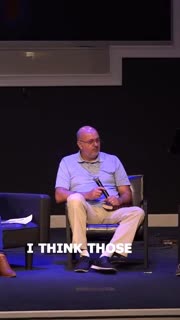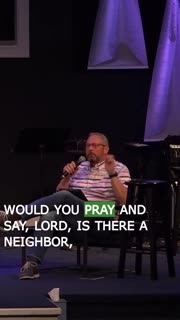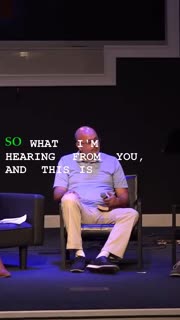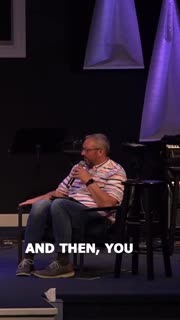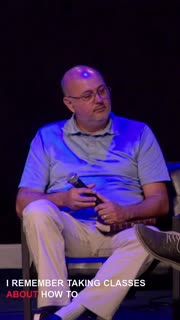Living God's Love: Engaging Neighbors with Kindness
Devotional
Sermon Summary
Bible Study Guide
Sermon Clips
### Quotes for Outreach
1. "I think those three stories, even by themselves, are enough for us to go, ooh, can take that, because I, if, if we don't know our neighbors, if we don't know those around us, I'm hoping we're feeling a little bit of, oh, Jesus might have a bigger plan for my life. Maybe he wants me to be the tangible hands and feet and voice of Jesus in somebody's life." [25:15] (26 seconds)
2. "I really appreciate this because it seems like your approach is actually a lot more like Jesus' approach, becoming friends, loving on people. I mean, like people need good news and the good news is not just spiritual good news. I mean, hungry people need to be fed. Refugees need to feel secure and have a home. Doctors need people who understand them, especially when they become the patient and neighbors who call the police on you." [36:24] (31 seconds)
3. "I have found something that in the midst of the chaos of life and that I have found the reason I was created. I have found the person who loves me and died for me and who makes me right and whole, even though I am still a mess, but God is walking with me." [38:48] (17 seconds)
4. "Bless, B-L-E-S-S. Beginning in prayer. Praying for people and asking God to show you where he's working. So that you can join him rather than you trying to lead God saying, Lord, what are you doing in my neighbor's life so that I can participate in that? I can bless them in that way. And then you listen. Listening to their stories. Listening to their needs." [48:11] (20 seconds)
5. "Would you pray and say, Lord, is there a neighbor, co-worker, friend, family member, distant family member? Is there somebody, Lord, that you would like me to enter and be involved in their life? I want to just ask, would you pray, God, show me somebody in the next step I can take with them to begin to pray for them? In this journey of loving my neighbor." [49:42] (26 seconds)
### Quotes for Members
1. "So what I'm hearing from you, and this is something that I need to internalize even more, is that like for you, Carlos, you had somebody actually do something with intent to hurt you. And yet rather than retaliating like most of us do, rather than being a normal neighbor and beginning, you know, the Hatfield and the McCoy, you might not, that might be a really old American kind of thing. But like where you're fighting back and forth. And it gets worse and worse as it goes on. Rather than doing that, you stopped it immediately and you did something nice." [22:28] (35 seconds)
2. "And then, you know, and then you, Jenny, to think of others the way they, you know, as I have been a foreigner, I have been a stranger, therefore I know that feeling. And when we were talking earlier, I thought about it, so does every single person in this room, because even if you grew up in Orlando and that's all you've ever known, you went to middle school. And you know what it's like to feel like a stranger, and like a foreigner, and like an alien." [23:30] (26 seconds)
3. "I remember taking classes about how to bring Jesus up in every conversation. And you, and it was almost like we were taught that that's what you always did because you, you had one moment with somebody and so you always talked about Jesus. And it always felt very awkward to me. It always felt very forced. Like it did, I wasn't reading the room and like, you know, feeling my emotional connection and going, no, I have to do this because it's right. And it never worked out well for me." [37:04] (27 seconds)
4. "I really feel like that's what being a neighbor is. That's what everything you've shared is, that we're not just sharing God's love for, like, the message of God's love. We are sharing that. We're doing it through our lives. We're doing it because we love them, and we want to share Jesus' love with them. And we just want people to know that they are loved." [42:52] (19 seconds)
5. "And so we have just a couple of minutes left. I would love for you just to quickly share with us any suggestions that you would offer to us how to invite people into our homes or into our lives. Like, any suggestions that you've said, oh, that's what I've done. And I'm thinking of one that you said, like, when for holidays you put baskets out and just said things." [48:11] (24 seconds)
Ask a question about this sermon
1. "I think those three stories, even by themselves, are enough for us to go, ooh, can take that, because I, if, if we don't know our neighbors, if we don't know those around us, I'm hoping we're feeling a little bit of, oh, Jesus might have a bigger plan for my life. Maybe he wants me to be the tangible hands and feet and voice of Jesus in somebody's life." [25:15] (26 seconds)
2. "I really appreciate this because it seems like your approach is actually a lot more like Jesus' approach, becoming friends, loving on people. I mean, like people need good news and the good news is not just spiritual good news. I mean, hungry people need to be fed. Refugees need to feel secure and have a home. Doctors need people who understand them, especially when they become the patient and neighbors who call the police on you." [36:24] (31 seconds)
3. "I have found something that in the midst of the chaos of life and that I have found the reason I was created. I have found the person who loves me and died for me and who makes me right and whole, even though I am still a mess, but God is walking with me." [38:48] (17 seconds)
4. "Bless, B-L-E-S-S. Beginning in prayer. Praying for people and asking God to show you where he's working. So that you can join him rather than you trying to lead God saying, Lord, what are you doing in my neighbor's life so that I can participate in that? I can bless them in that way. And then you listen. Listening to their stories. Listening to their needs." [48:11] (20 seconds)
5. "Would you pray and say, Lord, is there a neighbor, co-worker, friend, family member, distant family member? Is there somebody, Lord, that you would like me to enter and be involved in their life? I want to just ask, would you pray, God, show me somebody in the next step I can take with them to begin to pray for them? In this journey of loving my neighbor." [49:42] (26 seconds)
### Quotes for Members
1. "So what I'm hearing from you, and this is something that I need to internalize even more, is that like for you, Carlos, you had somebody actually do something with intent to hurt you. And yet rather than retaliating like most of us do, rather than being a normal neighbor and beginning, you know, the Hatfield and the McCoy, you might not, that might be a really old American kind of thing. But like where you're fighting back and forth. And it gets worse and worse as it goes on. Rather than doing that, you stopped it immediately and you did something nice." [22:28] (35 seconds)
2. "And then, you know, and then you, Jenny, to think of others the way they, you know, as I have been a foreigner, I have been a stranger, therefore I know that feeling. And when we were talking earlier, I thought about it, so does every single person in this room, because even if you grew up in Orlando and that's all you've ever known, you went to middle school. And you know what it's like to feel like a stranger, and like a foreigner, and like an alien." [23:30] (26 seconds)
3. "I remember taking classes about how to bring Jesus up in every conversation. And you, and it was almost like we were taught that that's what you always did because you, you had one moment with somebody and so you always talked about Jesus. And it always felt very awkward to me. It always felt very forced. Like it did, I wasn't reading the room and like, you know, feeling my emotional connection and going, no, I have to do this because it's right. And it never worked out well for me." [37:04] (27 seconds)
4. "I really feel like that's what being a neighbor is. That's what everything you've shared is, that we're not just sharing God's love for, like, the message of God's love. We are sharing that. We're doing it through our lives. We're doing it because we love them, and we want to share Jesus' love with them. And we just want people to know that they are loved." [42:52] (19 seconds)
5. "And so we have just a couple of minutes left. I would love for you just to quickly share with us any suggestions that you would offer to us how to invite people into our homes or into our lives. Like, any suggestions that you've said, oh, that's what I've done. And I'm thinking of one that you said, like, when for holidays you put baskets out and just said things." [48:11] (24 seconds)
